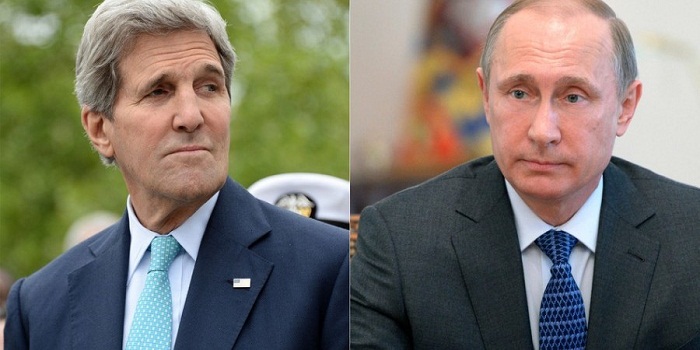Kerry also plans to raise with Putin and Russian Foreign Minister Sergei Lavrov the situation in Ukraine, where Russian-backed separatists and the government in Kiev are butting up against a self-imposed year-end deadline to end the fighting, Toner said. Kerry met with Putin once before this year, in the Black Sea resort of Sochi in May.
The pivot to the fighting in the Middle East and Eastern Europe comes as Kerry completes a week of talks in Paris over a climate-change accord.
On Sunday, he goes to Rome to co-chair a summit on Libya, where the Islamic State has been making inroads while U.N.-mediated talks aimed at forging a unity government have repeatedly fallen short. Italy, a former colonial power in Libya, fears that the Islamist group will send more migrants across the Mediterranean and use the North African country as a launching pad for terrorist attacks in Western capitals.
The war in Syria remains the most intractable problem and the focus of a large diplomatic push. On Monday, the French government is hosting foreign ministers from countries involved in Syria in one way or another. Later in the week, concerned nations hope to hold another meeting in New York to lay the groundwork for possible talks early next year between the government and its opponents.
More than 100 political and armed opposition groups met in Riyadh this week and agreed to a set of principles for negotiations that, at the core, would end with the departure of Syrian President Bashar al-Assad. The Syrian leader, however, still has solid support from Russia and Iran, and it is far from clear how an Assad exit could ultimately be finessed.
A large gap remains between those who say Assad should stay and all military efforts should be directed against the Islamic State and those who insist that Assad should leave power, preferably right away.
In a sign of infighting among Assad’s opponents, the largest and most radical of the rebel groups, Ahrar al-Sham, briefly walked out of the Riyadh conference to show its discontent with other participants and the role that Islam would play in a future Syria.
Washington has expressed unhappiness at Moscow`s military campaign in Syria, which has appeared to target Assad’s opponents more than the Islamic State, although there are indications that that is changing.
In an interview with Spanish media published Friday by the official Syrian Arab News Agency, Assad rejected the idea of negotiations with the opposition groups that met in Riyadh, further complicating the international efforts to facilitate talks on a cease-fire and political transition.
“They want the Syrian government to negotiate with the terrorists, something I don’t think anyone would accept in any country,” Assad said in the interview, which was also published by the Syrian news agency.
That was a reference to opposition groups supported by countries such as the United States and Saudi Arabia, which hosted the two-day conference of Syria’s notoriously divided array of nationalist and hard-line-Islamist opposition forces.
In the interview, Assad repeated his long-standing rejection of foreign-backed rebel groups, arguing that his government could only “deal with the real, patriotic, national opposition” that is not affiliated with “any other state or regime in the world.”
Armed opponents of his government, Assad said, must drop their weapons and stop fighting before any dialogue. “For us, in Syria, everyone who holds a machine gun is a terrorist,” Assad said, adding that it was unclear whether he would send a delegation to the meeting in New York on preparing for future talks.
Last month, the 17-nation International Syria Support Group agreed in Vienna on a framework for ending the Syrian war that includes holding negotiations early next year for agreeing to a cease-fire and political transition.
Even though divisions over what to do with Assad in a political transition are still a major hurdle in diplomacy to end the fighting, the Vienna meeting was a success in terms of bringing together the many countries involved in the multifaceted conflict. They included the United States and Saudi Arabia, as well as Assad’s foremost backers, Iran and Russia. The diplomatic push has gained urgency because of the rising power in Syria of extremist groups such as the Islamic State and the al-Qaeda-affiliated Jabhat al-Nusra.
Kerry said he has spoken in recent days with Saudi Arabia’s defense minister, Prince Mohammed bin Salman, and its foreign minister, Adel al-Jubeir, to keep apprised of the progress in the opposition talks.
“There are some questions and obviously a couple of — in our judgment — kinks to be worked out,” Kerry told reporters in brief remarks Friday. He added, “And I’m confident they’re going to be worked out.”
But Kerry said he was not sure that a summit in New York would happen Dec. 18 as proposed.
“I have to hear what the answers are to some questions that we have today,” he said. “And then we’ll let you know.”
In reply to another question, Kerry said the State Department is reviewing its procedures for granting visas in the wake of the massacre of 14 people in San Bernardino, Calif., by a husband-and-wife jihadist couple.
Tashfeen Malik, 29, a Pakistani woman, entered the United States on a K-1 fiancee visa in 2014 with her husband, Syed Rizwan Farook, 28, a U.S. citizen of Pakistani descent. They were killed in a police shootout shortly after the attack, leaving a 6-month-old daughter in the care of a grandmother.
“We need to make certain, given the new circumstances that we’re facing, that there’s no potential loophole whatsoever,” Kerry said. “And by and large, it is a very vetted, highly extensive review that takes place before anybody even qualifies. But we have to review whether or not there is some possibility that someone might be able to get through that. And obviously, it has to be fail-safe.”
More about:
















































